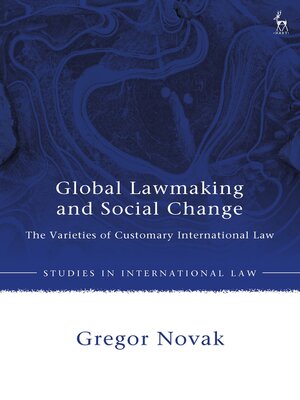Global Lawmaking and Social Change
ebook ∣ The Varieties of Customary International Law · Studies in International Law
By Gregor Novak

Sign up to save your library
With an OverDrive account, you can save your favorite libraries for at-a-glance information about availability. Find out more about OverDrive accounts.
Find this title in Libby, the library reading app by OverDrive.



Search for a digital library with this title
Title found at these libraries:
| Library Name | Distance |
|---|---|
| Loading... |
Customary international law is a widely-recognised modality of international lawmaking. It underpins all norms of international law and shapes all aspects of global society. Yet familiar approaches to customary international law struggle to answer basic questions about its role, operation, and prospects.
Pursuing an interdisciplinary approach, this book offers an alternative perspective on customary international law as a dynamic and multifaceted social phenomenon and idea. It explores customary international lawmaking in different social contexts, including the regulation of armed conflict, the treatment of the 'other', and the management of global environmental risks. Focusing on the 'varieties' of customary international law, it identifies four types of customary international law norms and explores their roles and implications.
Critically revisiting a classic topic of international law, the book provides a tool for understanding and shaping global lawmaking and social change in a rapidly changing international legal order.
Pursuing an interdisciplinary approach, this book offers an alternative perspective on customary international law as a dynamic and multifaceted social phenomenon and idea. It explores customary international lawmaking in different social contexts, including the regulation of armed conflict, the treatment of the 'other', and the management of global environmental risks. Focusing on the 'varieties' of customary international law, it identifies four types of customary international law norms and explores their roles and implications.
Critically revisiting a classic topic of international law, the book provides a tool for understanding and shaping global lawmaking and social change in a rapidly changing international legal order.







